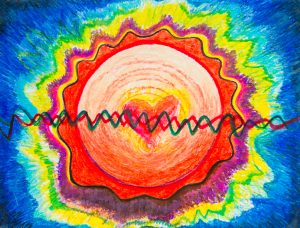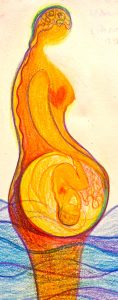How Music helps your Brain, Your Heart, and Your Recovery
Have you ever had a song come on the radio that suddenly transported you somewhere? A alcoholic friend of mine in recovery takes it as a “sign” whenever she hears the song from the movie Frozen “Let it Go,” reminding her that she is not in control and that is a good thing. Another woman I know listened to “I Gotta Feeling” by the Black Eyed Peas every day when she was recovering from Postpartum Depression. It was the thread she held onto when she had forgotten what joy felt like. For those four minutes and fifty-one seconds, she could remember.

Art by the author
Music enters the nervous system through the brainstem, which neuroscientists suggest may be the “seat of sentience.” In other words, music has the capacity to go straight to your feelings, bypassing more critical or verbal parts of your brain. Music enters your consciousness through “bottom-up processing.”
Our Brains Are Affected in a Similar Way As Songbirds.
Yes, you read that correctly. Our brains process music similarly to songbirds! Songs and music elicit feelings of pleasure and regulate emotions similarly for both humans and songbirds. Music elicits brain responses not only associated with pleasure but also “activates evolutionarily ancient neuroaffective mechanisms” that are critical for reproduction and survival. Music also “facilitates social contact, reduces conflict, communicates emotional state, and helps maintain interpersonal attachments.”
Music helps Your Brain Feel Good (Just like Sex, Drugs, and…oh yeah, Rock and Roll)
One study used PET (positron emission tomography), blood flow, heart rate, and respiration to image how the brain is affected by music. And guess what? Music was found to be rewarding by “recruiting neural systems” in a way that is similar to food, sex, or drugs of abuse. Music induced pleasure and stimulated endogenous reward systems (those opioids that are release naturally when you go for a run). Music was also found to inhibit brain areas, such as the amygdala and hippocampus that are associated with negative emotion. The amygdala is involved with fear and rage: it is the part of the brain that is stimulated in fight-or-flight response. For those suffering from trauma such as PTSD, the amygdala is most likely over-active or frequently triggered. The hippocampus is involved in memory consolidation. For those of you that watched the Pixar movie Inside Out, you know that losing those core memories (which happens when trauma occurs) is NOT A GOOD THING.
More Evidence for the Doubters
One study I found using lyric analysis (a music therapy technique that uses live or recorded music to listen to lyrics for use in counseling) showed how adolescents struggling with drug use and homelessness were helped. The study showed how using music therapy techniques such as songwriting and lyric analysis assisted in improvements in self-esteem, coping, and empowerment for homeless adolescents. Another study found high school music training to alter brain development for at-risk adolescents (Tierney, Krizman, Kraus, PNAS, 2015).

Art by the author
Even Pregnant Moms and not-yet-born babies benefit from music. In an article exploring best practices for treating depression, anxiety, and stress in pregnancy, it was found that listening to music and relaxation helped both the mother and the unborn child.
Listening to music has been found to decrease maternal plasma cortisol and self-reported state anxiety score in pregnant women awaiting amniocentesis. Maternal relaxation has also been shown to improve indices of fetal neurobehaviour, such as heart rate variability.
Although this may sound obvious, (of course music and relaxation help with anxiety! Duh!), I am happy to have empirical research supporting this. In an age when “Doing” is so often praised and valued more than Being, this research is a healing balm. I can now tell my pregnant and anxious mothers-to-be: Here is something you can DO that helps you and your little one! Put the music on and BE. It’s not about reading one more parenting book, getting one more educational toy, the exact right diaper service/sleep training approach/breast pump/formula, or getting one more thing accomplished at work. Although all of those things can be helpful, but obsessing about them can also feed the anxious, feeling Not-Enough part of the self. (Important side note: therapy and medication are two other important and often essential components to treating and recovering from perinatal anxiety and depression).
Music-As-Therapy: Cultivating Faith, Good Days, and Trying Everything
When I worked in the Psychiatric unit in the hospital, I would do groups using music as inspiration. As I am trained in expressive arts therapy, I would also use collage, art making, and poems. The music and art processes brought people in the room to tears more directly and quickly than any talk therapy could. Music is a direct route to the heart, bypassing all the critical mind defenses against vulnerability. The music went straight to what needed expressing and releasing.
One song that spoke to the patients was John Hiatt’s “Have A Little Faith In Me.” https://www.youtube.com/watch?v=7aYxMuLb3h8
When the road gets dark
And you can no longer see
Just let my love throw a spark
And have a little faith in me
And when the tears you cry
Are all you can believe
Just give these loving arms a try
And
Have a little faith in me
We’re Gonna Have A Good Day
One of my young clients shared with me that she listened to the song “Good Day” by Nappy Roots every day when she was going through residential rehab for her eating disorder recovery:
https://www.youtube.com/watch?v=nxKVAcqyD8I
It kept her going. It kept her focused on having a good day, setting that intention, again and again, for her recovery. It was a song that challenged all the negative voices in her head telling her she couldn’t do it, it wasn’t going to be a good day, or a good year, or a good life. It kept her out of the pit of hopelessness into which she was in danger of falling. It kept bringing her back from the edge, again and again. Nope, we’re not going there. We’re gonna have a good day.
Let’s begin Now
You know today I just woke up and I said
You know instead of waitin’ on a good day
Waitin’ around through up’s and down’s waitin
On something to happen I just say
We’re gonna have
We’re gonna have
We’re gonna have a good day
“Try Everything” (Shakira)
The song makes me want to dance at the same time every time I hear it. Just see if it doesn’t get you dancing (briefly setting aside the objectification of Gazelle’s body- that is another blog): https://www.youtube.com/watch?v=c6rP-YP4c5I
I wish this song were with me in my early recovery twenty years ago. The good news is that time doesn’t exist in the emotional world, so it is here with me now! I play this theme song from Zootopia every time my little one starts whining when we are on a hike about he “can’t do it.” It has become our theme song for the massive tears and transition of starting kindergarten. Look at these lyrics:
Birds don’t just fly, they fall down and get up
Nobody learns without getting it wrong
I won’t give up, no I won’t give in
‘Til I reach the end and then I’ll start again
No I won’t leave, I wanna try everything
I wanna try even though I could fail
Look how far you’ve come, you filled your heart with love
Baby you’ve done enough, take a deep breath
Don’t beat yourself up, don’t need to run so fast
In Conclusion
What music makes you happy? What helps calm anxiety? What music helps you heal? What music helps bring the tears, release the anger, affirm the grief? Your heart already knows what it is. Find that music. Get that music. Play that music, again and again. In the words of Nappy Roots: Now, Let’s Begin.
Dr. Linda Shanti is a Licensed Clinical Psychologist practicing in San Francisco. For a list of Dr. Linda’s Songs-to-Help-for-Different-Categories-of-Your-Life, go to her blog at Recoverymama.com
